外研版必修1 Module 2 My New Teachers Reading课件(51张ppt)
文档属性
| 名称 | 外研版必修1 Module 2 My New Teachers Reading课件(51张ppt) | 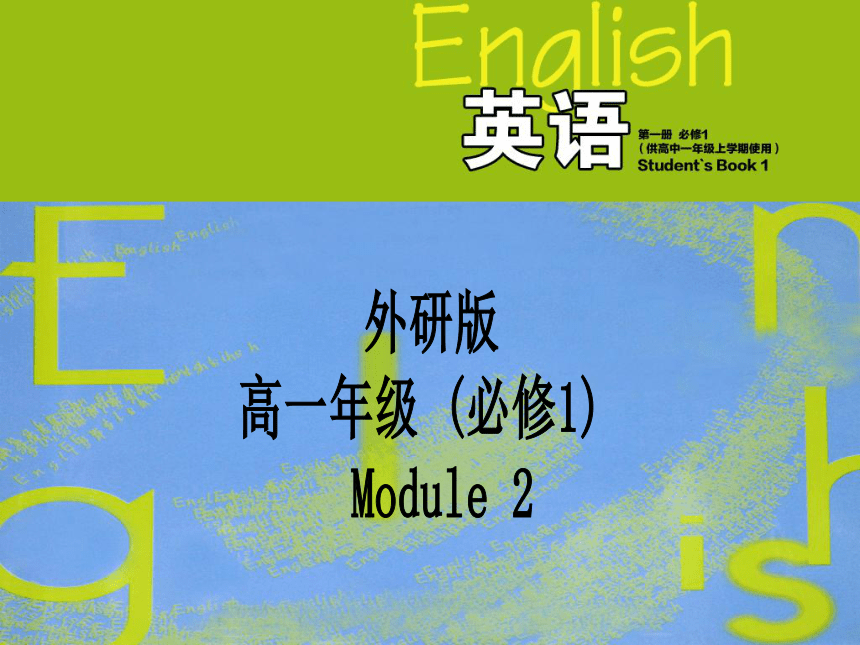 | |
| 格式 | zip | ||
| 文件大小 | 5.5MB | ||
| 资源类型 | 教案 | ||
| 版本资源 | 外研版 | ||
| 科目 | 英语 | ||
| 更新时间 | 2022-01-27 12:06:32 | ||
图片预览



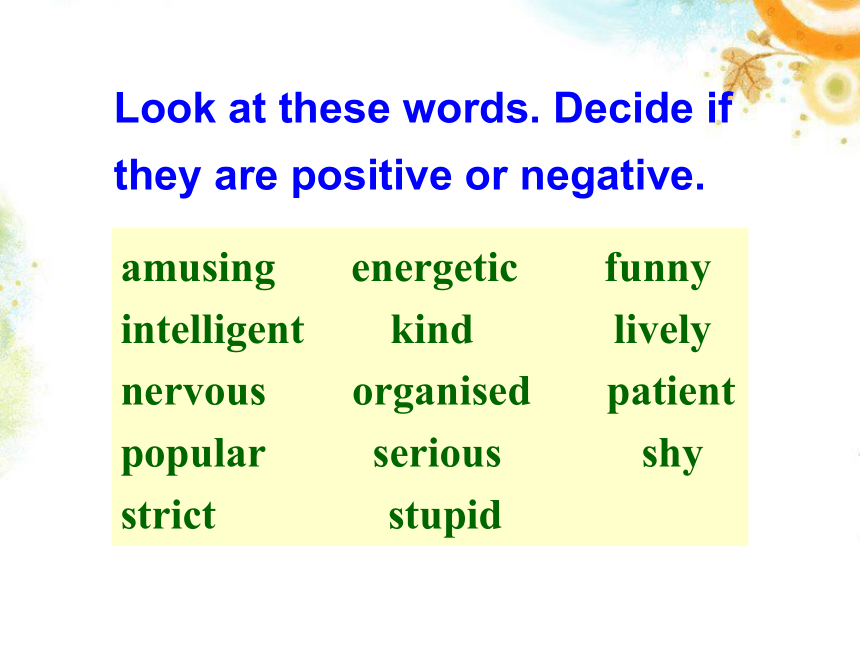
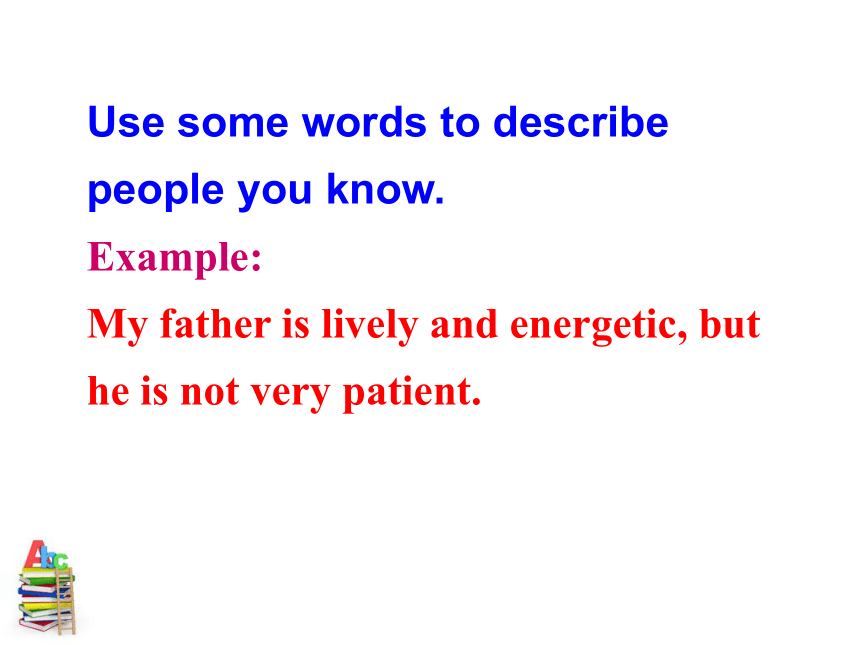
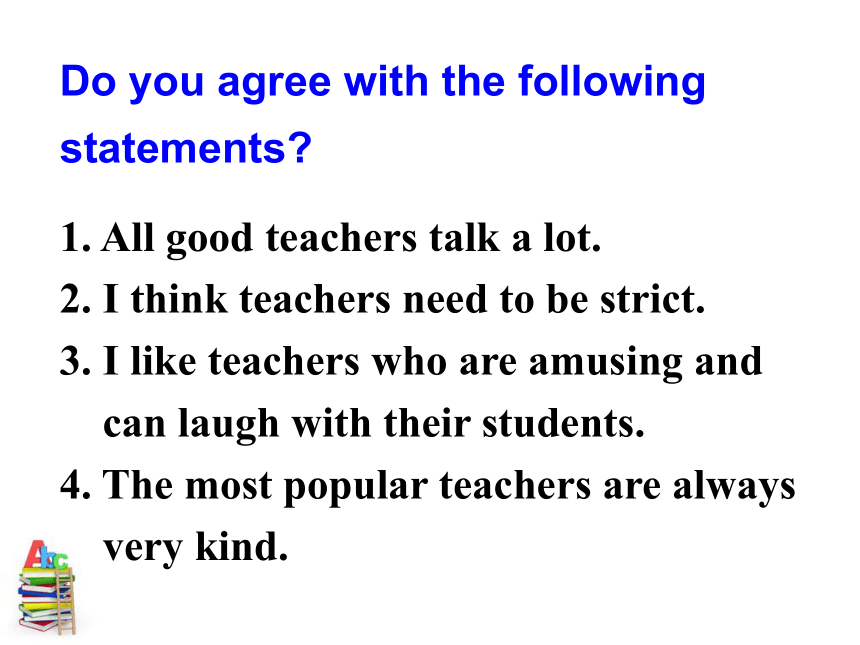
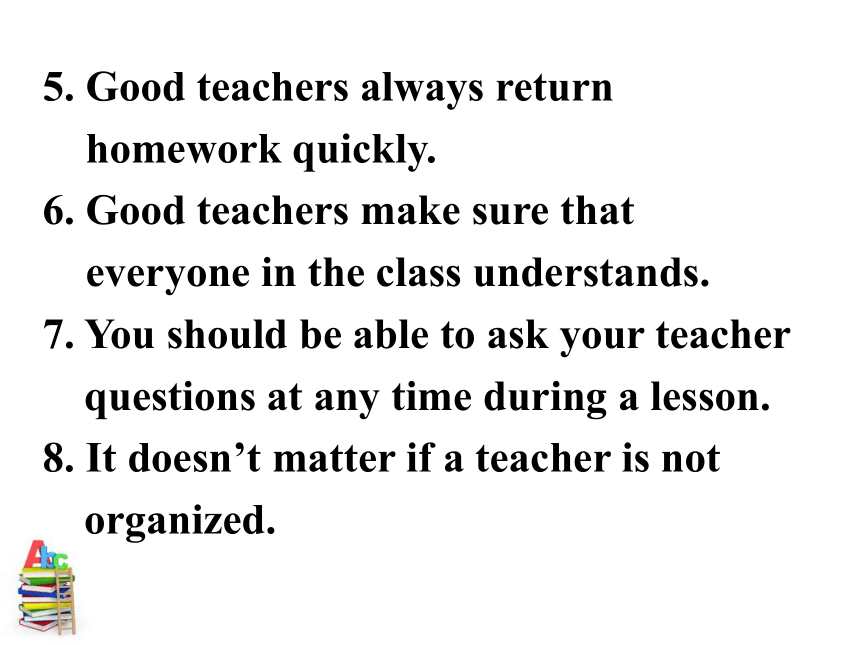
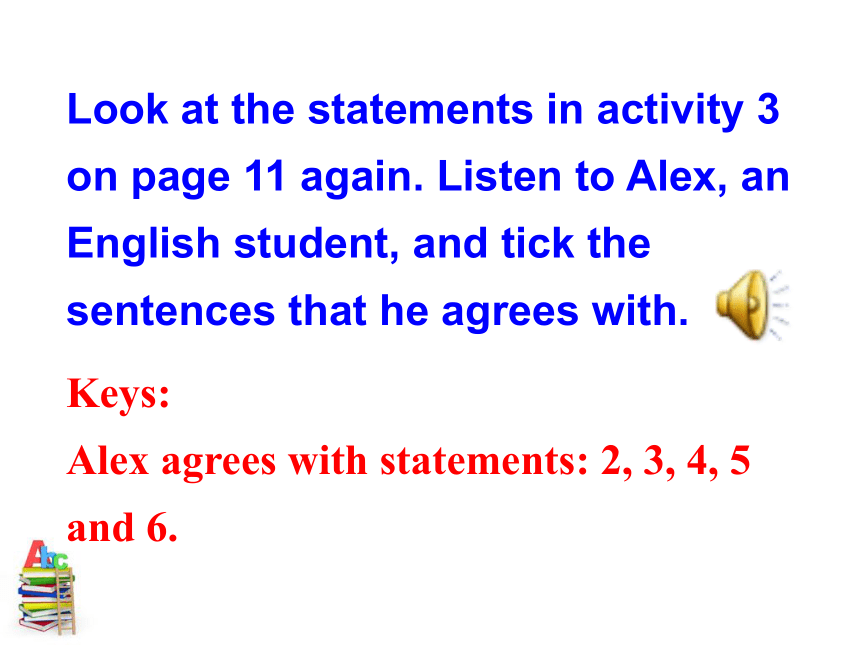
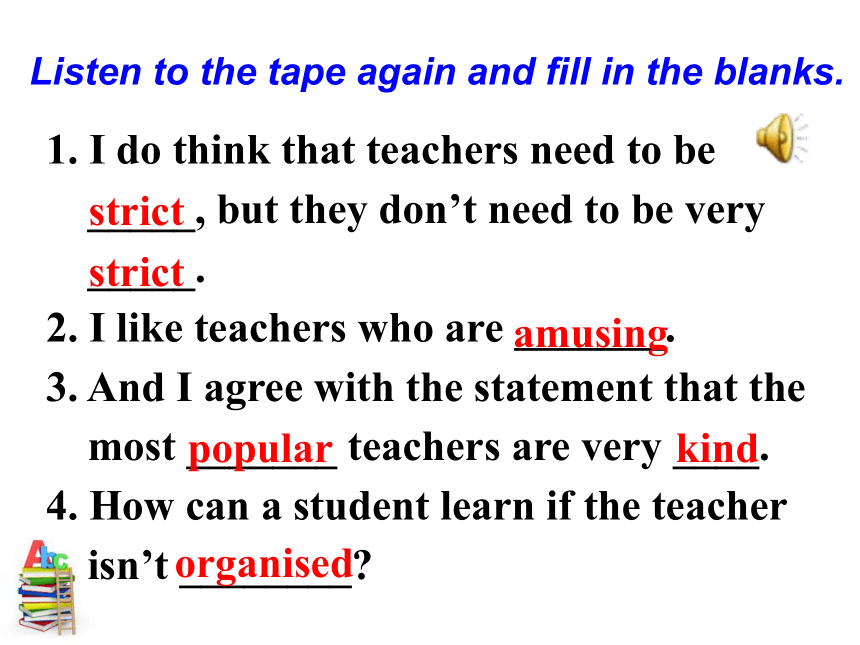



文档简介
(共51张PPT)
amusing energetic funny
intelligent kind lively
nervous organised patient
popular serious shy
strict stupid
Look at these words. Decide if they are positive or negative.
Use some words to describe
people you know.
Example:
My father is lively and energetic, but
he is not very patient.
1. All good teachers talk a lot.
2. I think teachers need to be strict.
3. I like teachers who are amusing and
can laugh with their students.
4. The most popular teachers are always
very kind.
Do you agree with the following statements
5. Good teachers always return
homework quickly.
6. Good teachers make sure that
everyone in the class understands.
7. You should be able to ask your teacher questions at any time during a lesson.
8. It doesn’t matter if a teacher is not organized.
Look at the statements in activity 3 on page 11 again. Listen to Alex, an English student, and tick the sentences that he agrees with.
Keys:
Alex agrees with statements: 2, 3, 4, 5 and 6.
Listen to the tape again and fill in the blanks.
1. I do think that teachers need to be _____, but they don’t need to be very _____.
2. I like teachers who are _______.
3. And I agree with the statement that the most _______ teachers are very ____.
4. How can a student learn if the teacher isn’t ________
strict
strict
amusing
kind
organised
popular
Look at the pictures. What are your
first impressions of the three teachers
Discuss with your partner.
young
beautiful
kind
good-looking
energetic
young
serious
strict
Useful words
amusing: causing laughter or smiles
energetic: full of energy
intelligent: having or showing intelligence
nervous: tense; excited; unstable
organized: orderly; ordered; arranged
serious: thoughtful; solemn; not joking
patient: having or showing patience
Listen to the text and check your
prediction and answer these
questions.
Mrs. Li _______________
Mrs. Chen _______________
Mr. Wu ____________________
kind and patient
strict and serious
energetic and amusing
1. Which teachers do students like a lot
Mrs Li, Mr Wu.
2. Who is a very good teacher but is
serious and strict
Mrs Chen.
1. Mrs Li wasn’t nervous at her first
lesson.
F
2. Mrs Li explains grammar clearly and I
can follow her.
T
3. She makes me feel stupid when I make
mistakes.
F
4. With her help, I begin to do better
in English.
T
Answer the following questions.
1. How old is Mr. Wu and how is he
He is about 28 and rather good-looking.
2. Is Mr. Wu liked by his students Why
Yes. Because he really enjoys teaching
Chinese literature.
3. What does he do when he gets excited
He talks loudly and fast, and waves his hands about a lot when he gets excited.
He tells jokes when the students get tired.
4. What does he do when his students
get tired
1. Which paragraphs tell us what the teachers look like
Second and third paragraphs.
2. What subjects does each teacher teach
Mrs Li — English, Mrs Chen — physics, Mr Wu — Chinese.
Answer these questions.
3. Who is the most popular teacher
Mr Wu.
4. Who is the kindest teacher
Mrs Li.
5. Which teacher are students most
afraid of
Mrs Chen.
6. Which teachers explain things clearly
Mrs Li, Mrs Chen.
Work in pairs. Which teacher would
you like to have Explain why.
Example:
I’d like to have Mrs Chen because her
teaching is well organized and clear.
1. My first impression of Mrs Li was that she was nervous and shy.
impression n. 可数名词,“印象”。
e.g. What were ___________________
of New York 你对纽约的第一印象是什么?
your first impressions
The old church ________________________ Tom.
那座古老的教堂给汤姆留下很深刻的印象。
one’s (first) impression of
某人对……的(最初)印象
made a great impression on
2. She’s kind and patient, and she explains English grammar so clearly that even I can understand it!
so ... that ... 如此……以至于……。
so修饰形容词或副词,that为结果状语 从句。
so + 形容词 / 副词 + that ...
so + 形容词 + a(n) + 可数单数 + that ...
e.g. He did the work ____________ I had
to do it all over again myself.
他干的太差劲了,我只好亲自重做。
She is ____________________ every
student likes her.
她是如此好的一个老师, 每个学生都
喜欢她。
so badly that
so good a teacher that
1) I haven’t seen Ann for ____ long that
I’ve forgotten what she looks like.
A. such B. very C. so D. too
2) The weather was _____ cold that I didn’t like to leave my room.
A. really B. such C. too D. so
3) Pop music is such an important part of society _____ it has even influenced our language.
A. as B. that
C. which D. where
4) His plan was such a good one _____
we all agreed to accept it.
A. so B. and C. that D. as
3. I’ve always hated making mistakes or
pronouncing a word incorrectly when
I speak English, but Mrs Li just smiles,
so that you don’t feel completely stupid!
1)always强调“一直是这样”。另外,be always doing表示“老是,老……”,多半表示责难。
e.g. He _____________________ about
something.
他老是发牢骚。
He ________________ for money.
他老是要钱。
Why ___________________ your nails
你为什么老是咬指甲?
is always complaining
was always asking
are you always biting
2)so that引导结果状语从句, “因此,这样……就”。
e.g. She is very careful, ________ she
seldom makes a mistake.
她非常细心,因此她很少犯错。
Nothing more was heard from him so
that we began to wonder if he was dead.
so that
没有他的任何音信,以至于我们开始怀疑他是否死了。
3)don’t feel completely stupid
don’t(否定词)和completely(表“全部”意思的词)放在一起表示部分否定。
e.g. All is not gold that glitters.
________________________
发光的并不都是金子。
= Not all that glitters is gold.
_________________________
= Not everybody would like it.
并不是每个人都会喜欢它。
He doesn’t know everything about it.
_______________________________
对此他并不完全了解情况。
Everybody wouldn’t like it.
= He knows not everything about it.
4. She’s very strict—we don’t dare
to say a word unless she asks us to.
unless相当于if … not, 意为“要不是,
除非”,也可以说成:
We don’t dare to say a word if she
does not ask us to.
e.g. My father comes home before dinner
every day, unless there is something
urgent to do.
= My father comes home before
dinner every day, ____________
anything urgent to do.
除非有急事,我父亲每天晚上都在晚餐前回家。
if there is not
注意:unless不可用于指尚未发生的事情的结果,因而不可用于“假想”条件句中。
e.g. We would have had a lovely holiday
_________________________
要不是天天下雨的话,我们的假日
就过得痛快了。
此句中的if …not不可用unless来替换。
if it hadn’t rained every day.
e.g. I’ll be sorry ___________ come to the
party.
万一他不来参加聚会,我就感到太
遗憾了。
此句中的if … not不可用unless 来替换。
此外,unless还可用于引出补充前言的
话,对刚说过的话想到要加些补充。
if he doesn’t
e.g. She hasn’t got any hobbies — unless
you call watching TV a hobby.
________________________________
________________________________
Have a cup of tea — ____________
prefer a cold drink.
喝一杯茶吧——除非你想喝冷饮。
她没有任何嗜好,除非把看电视也算作嗜好的话。
unless you’d
5. …because her teaching is so well
organized and clear.
organized为形容词,意为“有秩序
的;效率高的”。
e.g. a highly ________________
一个很有条理的人
a _______________ office
工作效率高的办事处
organized person
well-organized
此外,它还可意为“有安排的;有准备的”。
e.g. a ______________ event
组织地不好的事情
________________
有组织的犯罪活动
badly organized
organized crime
6. I feel I’m going to make progress with her.
make progress 取得进步
e.g. __________________________ every day. 好好学习,天天向上。
______________________ if you study
hard.
如果你努力学习, 你就会取得进步。
Study well and make progress
You will make progress
admit appreciate avoid hate joke literature respect scientific summary
Complete the sentences. Use these words. Change the form where necessary.
1. The young man ________ that he stole the money.
2. I love reading good _________.
3. Thank you so much. I really _________ your help.
4. It’s a very interesting ________ experiment.
5. I ____ being late for school.
admitted
literature
appreciate
scientific
hate
admit appreciate avoid hate joke literature respect scientific summary
6. Write a ________ of this text. Use about 100 words.
7. I try to _____ boring people.
8. I _______ you because you work hard and are a good person.
9. That ____ was very amusing.
summary
avoid
respect
joke
admit appreciate avoid hate joke literature respect scientific summary
1. how someone seems to you the first time you meet them
first impressions
2. in the wrong way
incorrectly
Find words and phrases in My New Teachers that match the definitions below.
3. be brave enough to do something
dare
4. move your hand through the air
wave about
5. handsome
good-looking
Preview
Preview the usage about verbs followed
by -ing on page 14.
1. Write more information about
your teachers. Try to use the words
we have learnt in this lesson.
2. Try to find out the structures about expressing preference.
amusing energetic funny
intelligent kind lively
nervous organised patient
popular serious shy
strict stupid
Look at these words. Decide if they are positive or negative.
Use some words to describe
people you know.
Example:
My father is lively and energetic, but
he is not very patient.
1. All good teachers talk a lot.
2. I think teachers need to be strict.
3. I like teachers who are amusing and
can laugh with their students.
4. The most popular teachers are always
very kind.
Do you agree with the following statements
5. Good teachers always return
homework quickly.
6. Good teachers make sure that
everyone in the class understands.
7. You should be able to ask your teacher questions at any time during a lesson.
8. It doesn’t matter if a teacher is not organized.
Look at the statements in activity 3 on page 11 again. Listen to Alex, an English student, and tick the sentences that he agrees with.
Keys:
Alex agrees with statements: 2, 3, 4, 5 and 6.
Listen to the tape again and fill in the blanks.
1. I do think that teachers need to be _____, but they don’t need to be very _____.
2. I like teachers who are _______.
3. And I agree with the statement that the most _______ teachers are very ____.
4. How can a student learn if the teacher isn’t ________
strict
strict
amusing
kind
organised
popular
Look at the pictures. What are your
first impressions of the three teachers
Discuss with your partner.
young
beautiful
kind
good-looking
energetic
young
serious
strict
Useful words
amusing: causing laughter or smiles
energetic: full of energy
intelligent: having or showing intelligence
nervous: tense; excited; unstable
organized: orderly; ordered; arranged
serious: thoughtful; solemn; not joking
patient: having or showing patience
Listen to the text and check your
prediction and answer these
questions.
Mrs. Li _______________
Mrs. Chen _______________
Mr. Wu ____________________
kind and patient
strict and serious
energetic and amusing
1. Which teachers do students like a lot
Mrs Li, Mr Wu.
2. Who is a very good teacher but is
serious and strict
Mrs Chen.
1. Mrs Li wasn’t nervous at her first
lesson.
F
2. Mrs Li explains grammar clearly and I
can follow her.
T
3. She makes me feel stupid when I make
mistakes.
F
4. With her help, I begin to do better
in English.
T
Answer the following questions.
1. How old is Mr. Wu and how is he
He is about 28 and rather good-looking.
2. Is Mr. Wu liked by his students Why
Yes. Because he really enjoys teaching
Chinese literature.
3. What does he do when he gets excited
He talks loudly and fast, and waves his hands about a lot when he gets excited.
He tells jokes when the students get tired.
4. What does he do when his students
get tired
1. Which paragraphs tell us what the teachers look like
Second and third paragraphs.
2. What subjects does each teacher teach
Mrs Li — English, Mrs Chen — physics, Mr Wu — Chinese.
Answer these questions.
3. Who is the most popular teacher
Mr Wu.
4. Who is the kindest teacher
Mrs Li.
5. Which teacher are students most
afraid of
Mrs Chen.
6. Which teachers explain things clearly
Mrs Li, Mrs Chen.
Work in pairs. Which teacher would
you like to have Explain why.
Example:
I’d like to have Mrs Chen because her
teaching is well organized and clear.
1. My first impression of Mrs Li was that she was nervous and shy.
impression n. 可数名词,“印象”。
e.g. What were ___________________
of New York 你对纽约的第一印象是什么?
your first impressions
The old church ________________________ Tom.
那座古老的教堂给汤姆留下很深刻的印象。
one’s (first) impression of
某人对……的(最初)印象
made a great impression on
2. She’s kind and patient, and she explains English grammar so clearly that even I can understand it!
so ... that ... 如此……以至于……。
so修饰形容词或副词,that为结果状语 从句。
so + 形容词 / 副词 + that ...
so + 形容词 + a(n) + 可数单数 + that ...
e.g. He did the work ____________ I had
to do it all over again myself.
他干的太差劲了,我只好亲自重做。
She is ____________________ every
student likes her.
她是如此好的一个老师, 每个学生都
喜欢她。
so badly that
so good a teacher that
1) I haven’t seen Ann for ____ long that
I’ve forgotten what she looks like.
A. such B. very C. so D. too
2) The weather was _____ cold that I didn’t like to leave my room.
A. really B. such C. too D. so
3) Pop music is such an important part of society _____ it has even influenced our language.
A. as B. that
C. which D. where
4) His plan was such a good one _____
we all agreed to accept it.
A. so B. and C. that D. as
3. I’ve always hated making mistakes or
pronouncing a word incorrectly when
I speak English, but Mrs Li just smiles,
so that you don’t feel completely stupid!
1)always强调“一直是这样”。另外,be always doing表示“老是,老……”,多半表示责难。
e.g. He _____________________ about
something.
他老是发牢骚。
He ________________ for money.
他老是要钱。
Why ___________________ your nails
你为什么老是咬指甲?
is always complaining
was always asking
are you always biting
2)so that引导结果状语从句, “因此,这样……就”。
e.g. She is very careful, ________ she
seldom makes a mistake.
她非常细心,因此她很少犯错。
Nothing more was heard from him so
that we began to wonder if he was dead.
so that
没有他的任何音信,以至于我们开始怀疑他是否死了。
3)don’t feel completely stupid
don’t(否定词)和completely(表“全部”意思的词)放在一起表示部分否定。
e.g. All is not gold that glitters.
________________________
发光的并不都是金子。
= Not all that glitters is gold.
_________________________
= Not everybody would like it.
并不是每个人都会喜欢它。
He doesn’t know everything about it.
_______________________________
对此他并不完全了解情况。
Everybody wouldn’t like it.
= He knows not everything about it.
4. She’s very strict—we don’t dare
to say a word unless she asks us to.
unless相当于if … not, 意为“要不是,
除非”,也可以说成:
We don’t dare to say a word if she
does not ask us to.
e.g. My father comes home before dinner
every day, unless there is something
urgent to do.
= My father comes home before
dinner every day, ____________
anything urgent to do.
除非有急事,我父亲每天晚上都在晚餐前回家。
if there is not
注意:unless不可用于指尚未发生的事情的结果,因而不可用于“假想”条件句中。
e.g. We would have had a lovely holiday
_________________________
要不是天天下雨的话,我们的假日
就过得痛快了。
此句中的if …not不可用unless来替换。
if it hadn’t rained every day.
e.g. I’ll be sorry ___________ come to the
party.
万一他不来参加聚会,我就感到太
遗憾了。
此句中的if … not不可用unless 来替换。
此外,unless还可用于引出补充前言的
话,对刚说过的话想到要加些补充。
if he doesn’t
e.g. She hasn’t got any hobbies — unless
you call watching TV a hobby.
________________________________
________________________________
Have a cup of tea — ____________
prefer a cold drink.
喝一杯茶吧——除非你想喝冷饮。
她没有任何嗜好,除非把看电视也算作嗜好的话。
unless you’d
5. …because her teaching is so well
organized and clear.
organized为形容词,意为“有秩序
的;效率高的”。
e.g. a highly ________________
一个很有条理的人
a _______________ office
工作效率高的办事处
organized person
well-organized
此外,它还可意为“有安排的;有准备的”。
e.g. a ______________ event
组织地不好的事情
________________
有组织的犯罪活动
badly organized
organized crime
6. I feel I’m going to make progress with her.
make progress 取得进步
e.g. __________________________ every day. 好好学习,天天向上。
______________________ if you study
hard.
如果你努力学习, 你就会取得进步。
Study well and make progress
You will make progress
admit appreciate avoid hate joke literature respect scientific summary
Complete the sentences. Use these words. Change the form where necessary.
1. The young man ________ that he stole the money.
2. I love reading good _________.
3. Thank you so much. I really _________ your help.
4. It’s a very interesting ________ experiment.
5. I ____ being late for school.
admitted
literature
appreciate
scientific
hate
admit appreciate avoid hate joke literature respect scientific summary
6. Write a ________ of this text. Use about 100 words.
7. I try to _____ boring people.
8. I _______ you because you work hard and are a good person.
9. That ____ was very amusing.
summary
avoid
respect
joke
admit appreciate avoid hate joke literature respect scientific summary
1. how someone seems to you the first time you meet them
first impressions
2. in the wrong way
incorrectly
Find words and phrases in My New Teachers that match the definitions below.
3. be brave enough to do something
dare
4. move your hand through the air
wave about
5. handsome
good-looking
Preview
Preview the usage about verbs followed
by -ing on page 14.
1. Write more information about
your teachers. Try to use the words
we have learnt in this lesson.
2. Try to find out the structures about expressing preference.
